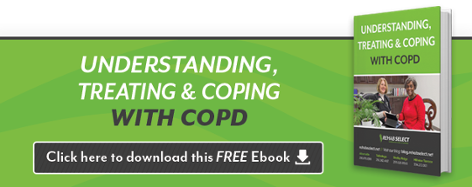 Have you recently been diagnosed with Chronic Obstructive Pulmonary Disease, or COPD? If so, you're not alone. Approximately 24 million people in the US currently live with this disease.
Have you recently been diagnosed with Chronic Obstructive Pulmonary Disease, or COPD? If so, you're not alone. Approximately 24 million people in the US currently live with this disease.
Coping with COPD doesn't necessarily mean you have to give up your normal life however. Instead, you can learn how to manage your disease so that you can live fully and actively.
Essential steps to coping
- Work closely with your doctor
Your doctor will work with you to help you manage your new diagnosis and the changes that come with it. You'll learn to understand your lungs and their function, be prescribed oxygen therapy and medications to reduce symptoms, and learn breathing techniques so that you can control your breathing instead of allowing it to control you.
- Join a pulmonary rehabilitation program
Once you're well enough to leave the hospital, you and your doctor may decide that it's wise for you to join a pulmonary rehabilitation program at a skilled nursing facility. You may be referred directly from the hospital upon discharge, and/or you may participate in a pulmonary rehabilitation on an outpatient basis.
Why is a pulmonary rehabilitation program necessary?
- It's designed for you and your specific symptoms
A pulmonary rehab program is designed especially for you based upon your current needs. Therapists with special training in occupational, physical and respiratory therapy will teach you skills that will help you manage your COPD so that you can stay as healthy and active as possible.
What happens when you join a pulmonary rehabilitation program?
- Team members will take a health history
Your team will take a health history and talk with you about your current lifestyle and goals.
- You'll learn about various means of coping with symptoms
Breathing techniques, medications, oxygen supplementation, diet and relaxation techniques can all help you do more with fewer episodes of shortness of breath.
- Your oxygen level, blood pressure and heart rate will be monitored as you exercise
Your team has to assess your current success, so they'll monitor as you walk to measure blood pressure, heart rate, and oxygen level. Don't worry if you can't walk very far at first. The focus is on gradual, safe improvement.
- Why exercise is so important
Exercise can't reverse symptoms, but it can help you improve function, breathing, and overall feelings of well-being. Your team will make sure that you exercise safely. Once you've mastered exercising and are coping with symptoms well, you should keep up with your exercise program at least three days a week.
Avoiding exacerbations or flareups
You'll also learn to avoid exacerbations or flareups that happen when COPD gets worse and you become sick. Most often, this is linked to an infection, and it can be serious. Exacerbations can cause progression, so it's important to prevent them as much is possible.
- Improve the air quality in your home
Allergens like dust mites, pollen, and pet dander, or irritants like tobacco smoking and cleaning product fumes can exacerbate symptoms. It's important to remove these allergens and irritants as much as possible.
About smoking
If you currently smoke, stop. Quitting now will slow the progression of COPD, and it also makes the air in your home cleaner – which again can help you avoid exacerbating symptoms.





